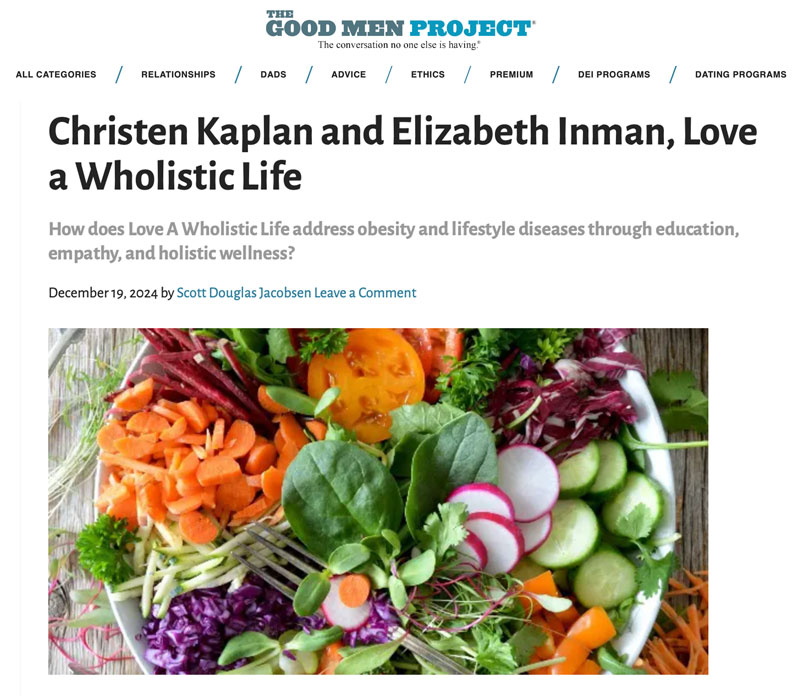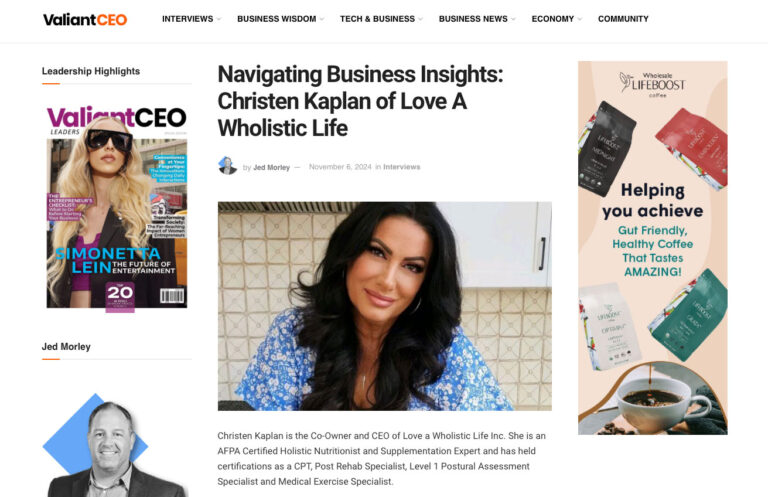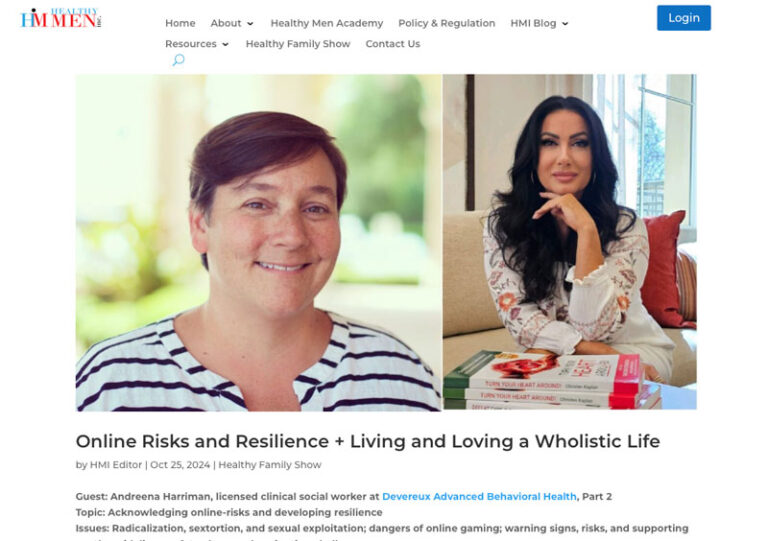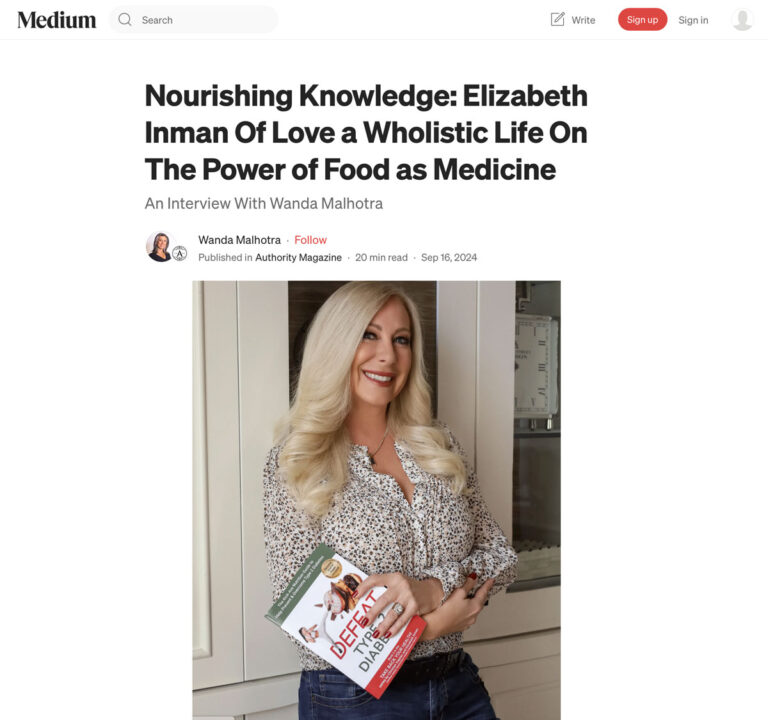The Good Men Project – Christen Kaplan and Elizabeth Inman, Love a Wholistic Life

Reposted from The Good Men Project. by Scott Douglas Jacobsen
Scott Douglas Jacobsen: How does the CDC’s statistic that two in five U.S. adults are living with obesity reflect broader societal trends?
Christen Kaplan and Elizabeth Inman: First, let’s look at what the definition of overweight or obesity means. The World Health Organization (WHO) defines overweight and obesity as having “excessive fat accumulation that presents a risk to health.” So, what does this mean for American adults? It means that obesity is a leading public health problem in the United States. The latest data from the CDC indicates that approximately 75% of adults aged 20 and older fall into the overweight and obese categories and 1 out of 10 of those are considered morbidly or severely morbidly obese. This is a serious concern because the five leading causes of preventable death in the United States are heart disease, stroke, respiratory disease (COPD), type 2 diabetes, and cancer which are all conditions linked to lifestyle choices and excessive weight gain.
According to the Joint Economic Committee Congress of The United States, obesity alone costs the U.S. healthcare system almost $283 billion annually on obesity-related direct health costs and is a major driver of federal healthcare spending. This includes money spent directly on medical care and prescription drugs that are related to the lifestyle conditions associated with extreme weight gain. Lastly, another important statistic from Human Resource & Payroll estimates that conditions associated with excessive weight gain have caused an additional $435.5 billion in economic costs to U.S. businesses and employers in 2023. Included in these expenses are medical costs to employers, higher disability payments, higher workers’ compensation program costs, and absenteeism at work. All of these economic societal trends severely affect the way our society functions.
Jacobsen: How does Love a Wholistic Life approach obesity differently?
Kaplan and Inman: At Love A Wholistic Life, we believe that education is the key to empowerment. Our holistic approach takes a comprehensive look at the body, examining its physical, emotional, and mental dimensions. Rather than simply focusing on weight loss, we prioritize uncovering the root causes of obesity. We recognize that excessive weight gain often signals deeper lifestyle conditions, emotional struggles, or unresolved issues. Research indicates that around 75% of excessive eating is emotionally driven, turning into habits that obscure underlying feelings. Many individuals’ resort to food as a means of escape, coping, or numbing rather than addressing their emotions head-on.
By providing our clients with the tools and resources they need, we help them address these underlying factors, fostering sustainable change rather than temporary fixes. Our program emphasizes education and self-discovery, equipping individuals with knowledge about their bodies and behaviors. Through personalized and online coaching, we guide our clients in developing healthier habits and making informed choices that support their overall well-being. Our clients learn to approach food and lifestyle with intention and mindfulness. This holistic journey not only promotes weight loss but also enhances overall quality of life, empowering individuals to thrive in all aspects of their health.
Jacobsen: How might Love A Wholistic Life address the root causes of lifestyle diseases?
Kaplan and Inman: Addressing the causes of lifestyle diseases involves understanding their multifaceted origins and understanding what the definition of a lifestyle disease means. A lifestyle disease is a health condition primarily influenced by an individual’s lifestyle choices and behaviors rather than by genetic factors or infectious agents. These diseases are often preventable and can be linked to factors such as poor diet, lack of quality sleep, stress, lack of physical activity, tobacco use, recreational drug use, overconsumption of prescription drugs, and excessive alcohol consumption. Common examples of lifestyle diseases include cardiovascular disease, stroke, type 2 diabetes, obesity, inflammatory disease, and certain types of cancer. Lifestyle diseases typically develop over time due to cumulative unhealthy habits and can often be managed or mitigated through lifestyle changes. We find that the best approach is addressing these conditions through education. By teaching our clients what it means when they have been diagnosed with these lifestyle diseases, we explain what is going on in their bodies when they have a lifestyle disease, how they got the disease in the first place, and how they can use healthy lifestyle choices to control and possibly eliminate these conditions. Using natural approaches such as proper nutrition, getting active, and reducing or eliminating foods and behaviors that sabotage their health is key to improving and even reversing lifestyle disease. Basically, we teach people how to understand their body from the inside out as opposed to just thinking about it from just a weight loss perspective. In addition, we educate our clients to be advocates for their health by asking their healthcare professionals questions until they have a full understanding of what is happening in their bodies.
Jacobsen: What experience of loss has shaped your experience to wellness?
Kaplan and Inman: As children, we watched our parents grapple with the harsh realities of lifestyle diseases. Our mother’s struggle with prescription drug addiction and our father’s battle with severe obesity left deep scars on our family. It wasn’t just their health that suffered; the emotional toll reverberated through every aspect of our lives. We learned early on how devastating these conditions could be, not just for the individuals but for the entire family. As we transitioned into adulthood, we hoped to leave behind the struggles of our youth. Yet, in a cruel twist of fate, lifestyle diseases reared its ugly head yet again. At just 52, our oldest brother was taken from us far too soon due to heart disease, kidney failure and other complications associated with type 2 diabetes. His passing served as a stark reminder that these issues know no bounds—they can affect anyone, regardless of age or circumstance. Each of these experiences became a powerful lesson, igniting a passion for nutrition and wellness within us. We realized that understanding the roots of these diseases was essential not just for our own health, but for breaking the cycle within our family. We immersed ourselves in learning about healthy living, exploring how nutrition, exercise, and mental well-being intertwine. Our journey transformed from one of pain to one of empowerment.
We began advocating for healthier lifestyles, not just for ourselves but for others in our community. We became passionate about sharing our story, hoping to inspire change and raise awareness about the importance of nutrition and healthy lifestyle choices. In doing so, we discovered a renewed sense of purpose— turning our past struggles into a beacon of hope for ourselves and those around us. We are committed to breaking the cycle of lifestyle diseases, proving that change is possible and that every step toward health is a step toward a brighter future.
Jacobsen: What are key principles of plant-based nutrition?
Kaplan and Inman: To truly grasp the key principles of plant-based nutrition, we first need to understand what the term “food” encompasses. According to Oxford Languages, “food” refers to any nutritious whole or minimally processed items primarily derived from plant sources, including fruits, vegetables, whole grains, legumes, nuts, and seeds. Plant-based nutrition advocates for a diverse range of food choices to ensure a wide array of natural options that are low in calories yet high in fiber, antioxidants, nutrients, vitamins, and minerals. It encourages the inclusion of healthy fats from sources like avocados and olive oil, as well as plant-based proteins from beans and legumes. Additionally, it promotes limiting added sugars and processed foods. For our clients, we emphasize that these foods play a crucial role in their bodies, not only supporting growth but also nourishing every cell and organ. This nutrient-rich approach helps our bodies thrive, bolsters the immune system, and provides essential protection for overall health.
Jacobsen: How do you define a healthy relationship with food?
Kaplan and Inman: A healthy relationship with food begins with the understanding that it serves as more than just sustenance; food has the power to heal and nourish our bodies on multiple levels. Recognizing this transformative potential can shift our perspective and highlight the importance of choosing a nutrient-dense diet rich in fruits, vegetables, beans, nuts, seeds, and whole grains. When we view food through the lens of healing, we start to appreciate its role in enhancing our well-being. Each bite becomes an opportunity to nourish not only our bodies but also our minds and spirits. Foods packed with vitamins, minerals, and antioxidants can help reduce inflammation, boost our immune system, and support our mental health. For example, vibrant fruits and vegetables provide essential nutrients that contribute to overall vitality, while whole grains offer sustained energy and promote digestive health. Furthermore, embracing this philosophy encourages mindfulness in our eating habits. It invites us to cultivate a deeper connection with our food—considering where it comes from, how it’s prepared, and the impact it has on our health. This awareness can foster more intentional choices, steering us away from processed foods laden with unhealthy additives and toward whole, nourishing options that support our well-being and guide us through our journey to good health.
Jacobsen: What role does empathy play in your work with clients?
Kaplan and Inman: In our opinion, empathy is one of the most vital qualities for success in our business. The ability to genuinely put ourselves in our clients’ shoes—both emotionally and situationally—allows us to grasp their unique perspectives and challenges. This deep understanding gives us a comprehensive view of their needs, enabling us to address their health issues in a more personalized manner. Empathy also empowers us to meet our clients exactly where they are in their journey. By acknowledging their emotional state, we can address not only their physical well-being but also their mental and emotional health. This holistic approach fosters a supportive environment where clients feel heard and valued. Our commitment to empathy goes beyond transactions; we strive to build meaningful relationships. In the process, we’ve not only gained clients but have also cultivated amazing long-term friendships. We take pride in being more than just their nutritionist and wellness coach; we aim to be a trusted ally in our clients’ lives. Their stories and experiences inspire us to continually improve and adapt our services, ensuring that we are not just meeting expectations but exceeding them.
Jacobsen: What role does empathy play in your work with clients?
Kaplan and Inman: In our opinion, empathy is one of the most vital qualities for success in our business. The ability to genuinely put ourselves in our clients’ shoes—both emotionally and situationally—allows us to grasp their unique perspectives and challenges. This deep understanding gives us a comprehensive view of their needs, enabling us to address their health issues in a more personalized manner. Empathy also empowers us to meet our clients exactly where they are in their journey. By acknowledging their emotional state, we can address not only their physical well-being but also their mental and emotional health. This holistic approach fosters a supportive environment where clients feel heard and valued. Our commitment to empathy goes beyond transactions; we strive to build meaningful relationships. In the process, we’ve not only gained clients but have also cultivated amazing long-term friendships. We take pride in being more than just their nutritionist and wellness coach; we aim to be a trusted ally in our clients’ lives. Their stories and experiences inspire us to continually improve and adapt our services, ensuring that we are not just meeting expectations but exceeding them.
Jacobsen: What are the most common misconceptions people have about nutrition and tackling obesity?
Kaplan and Inman: One common misconception is that all carbohydrates are alike, but that’s simply not true! There are actually two main types of carbohydrates: simple and complex.
Simple carbohydrates are often found in ultra-processed foods like soda, baked treats, packaged cookies, fruit juice concentrates, and many breakfast cereals. These carbs provide a quick boost of energy but can also spike blood sugar levels. Because they lack fiber and essential nutrients, simple carbs are often referred to as “empty calories.”
On the other hand, complex carbohydrates are found in whole grains, beans, fruits, and vegetables. They offer a more gradual release of energy, leading to a slower, steadier rise in blood sugar over time. Complex carbohydrates are not only beneficial for sustained energy but are also easily processed by the body, providing essential nutrients that support overall health.
Another common misconception is that all fats are unhealthy. That is also not true. In fact, healthy fats, such as monounsaturated and polyunsaturated fats, are found in foods like avocados, wild-caught fish, nuts, seeds, and extra virgin olive oil. These fats provide protein, fiber, and essential vitamins, playing vital roles in building cell membranes, aiding blood clotting, supporting muscle movement, and promoting heart and brain health.
In contrast, unhealthy fats include saturated fats and trans fats. These fats are typically found in animal-based foods such as fatty cuts of meat, dairy products, and tropical oils like coconut and palm oil, which are often used in fried foods, baked goods, and processed snacks. These unhealthy fats can negatively impact cholesterol and blood sugar levels, increasing the risk of heart disease, diabetes, and obesity.
Some of our clients have held the misconception that taking a daily multivitamin allows them to eat less healthy foods without consequence. While multivitamins can be beneficial for filling certain nutritional gaps, they are not a substitute for a well-balanced diet. A nutritious diet rich in fiber, protein, antioxidants, and healthy fats provides a range of essential nutrients that multivitamins simply cannot replicate. Whole foods offer synergistic benefits that enhance nutrient absorption and overall health. For example, fruits and vegetables are packed with antioxidants that help combat oxidative stress, while whole grains provide fiber that supports digestive health. Additionally, healthy fats from sources like avocados and nuts contribute to brain health and hormone regulation.
Relying solely on supplements can lead to deficiencies in key nutrients and may not provide the same health benefits as consuming a variety of whole foods. Ultimately, a balanced diet is crucial for maintaining optimal health, supporting bodily functions, and reducing the risk of chronic diseases.
Jacobsen: How do you measure success in clients?
Kaplan and Inman: Success often holds different meanings for each of our clients. Since we primarily work with individuals struggling with obesity and lifestyle diseases, their definitions of success depend on the personal goals they set. Some clients focus solely on weight loss, while many aim to reduce their reliance on prescription medications. Common concerns among our clients include regulating blood pressure, lowering glucose levels, and reducing cholesterol. We measure their success by assessing how well they transition into positive lifestyle changes that are sustainable beyond our support. As they achieve their personal goals, we empower them with the tools and knowledge necessary to maintain a lifestyle that promotes a healthy quality of life.
Adopting healthy lifestyle changes, such as proper nutrition, is not merely about eating the right foods; it also involves understanding why our bodies require these nutrients and recognizing the detrimental effects of the Standard American Diet, which often leads to lifestyle diseases. Clients must embrace the reality that their choices can have either a positive impact on their health or lead to negative consequences. While some clients find that they can maintain their progress with little to no ongoing support after just a few months in the program, others face a longer journey and require our guidance until they feel confident managing on their own. The rise of “quick-fix” prescription weight-loss drugs has made our job more challenging, often undermining long-term success for many in the overweight and obese community. This is a constant battle for us, but it’s one we are committed to fighting for the well-being of our clients.
Jacobsen: Thank you very much for the opportunity and your time, Christen and Elizabeth.






